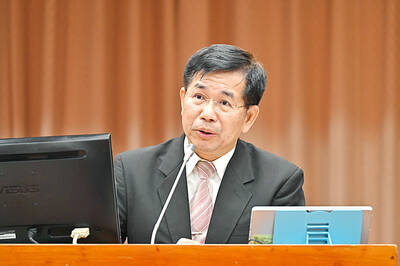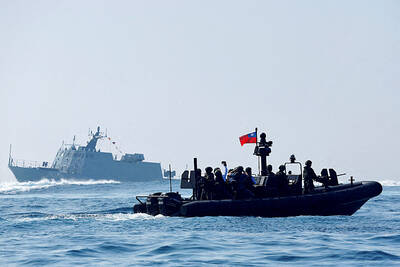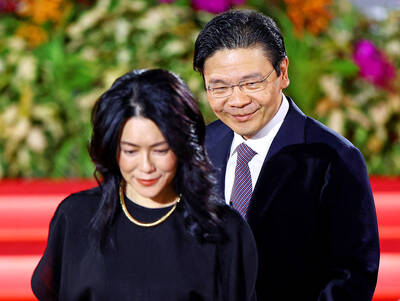Committee of Illegal Party Asset Settlement Chairman Wellington Koo (顧立雄) yesterday announced his picks for committee members, while confirming the appointment of Agency Against Corruption Deputy Director-General Hung Pai-ken (洪培根) as deputy chairman.
Koo said he knows that the Ministry of Justice’s Prosecutors’ Personnel Review Committee opposed the appointment of Hung — who is to quit his post to join the committee when it becomes active next month — but Koo asked that prosecutors show “forbearance and understanding.”
The post of assets committee secretary-general is to be filled by Chang Hung-tse (張弘澤), counselor of review and evaluations with the Mongolian and Tibetan Affairs Commission, Koo said.
Koo said he has appointed Lo Cheng-chung (羅承宗), associate professor of financial and economic law at Southern Taiwan University of Science and Technology, and Shih Chin-fang (施錦芳), former commissioner of the Pingtung County Government Tax Bureau, as full-time committee members, while a third full-time member would be appointed later.
The committee’s eight part-time members are former Chinese Nationalist Party (KMT) spokesperson Yang Wei-chung (楊偉中); former Social Democratic Party legislative candidate Lee Yen-jong (李晏榕); Judicial Reform Foundation secretary-general Lin Che-wei (林哲瑋); National Chengchi University professor of history Li Fu-chung (李福鐘); accountant Jao Yueh-chin (饒月琴); and lawyers Wu Yu-hsueh (吳雨學), Yuan Hsiu-hui (袁秀慧) and Chang Shih-hsing (張世興), Koo said.
Premier Lin Chuan (林全) gave him “a lot of latitude and trust” in the appointments, Koo said, quoting the premier as saying: “I have no objections whatsoever.”
“Achieving a balance between the political parties was difficult, because committee members cannot hold positions in a party or be an elected representative, while pan-blue camp politicians I spoke to said the requirements put them in a difficult position,” Koo said. “In the end, the appointments were based on professional credentials and competence.”
Koo said Lin Che-wei was selected because he was involved in government transparency groups, such as Watchout Co and online community G0V.tw, and is to assist in making committee operations more transparent and use information technology to better communicate with the public.
KMT Deputy Secretary-General Lin Te-fu (林德福) said he had “no comment” on the appointments.
He said that Democratic Progressive Party (DPP) lawmakers practiced “majority violence,” using floor votes to quash dissent.
He called the Act Governing the Handling of Ill-gotten Properties by Political Parties and Their Affiliate Organizations (政黨及其附隨組織不當取得財產處理條例) “illegal and unconstitutional.”
KMT Legislator Sufin Siluko (廖國棟) said Koo is a “deep-green person” and the party asset settlement process will “predictably develop a complete pro-green bias.”
The appointees are “controversial people” who will make reconciliation between parties “utterly impossible,” Sufin said.
“Taiwanese society will become more fragmented and partisan because the committee is a source of chaos,” Sufin said.
DPP Legislator Lee Chun-yi (李俊俋) said the KMT should “face the facts and deal with [its assets] as soon as possible, instead of continuing with its futile resistance.”
“If the KMT position is that the law is illegal or unconstitutional, it should specify what clauses are a breach of the law or the Constitution,” Lee Chun-yi said.

The International Industrial Talents Education Special (INTENSE) Program to attract foreigners to study and work in Taiwan will provide scholarships and a living allowance of up to NT$440,000 per person for two years beginning in August, Minister of Education Pan Wen-chung (潘文忠) told a meeting of the legislature’s Education and Culture Committee yesterday. Pan was giving an update on the program’s implementation, a review of universities’ efforts to recruit international students and promotion of the Taiwan Huayu Bilingual Exchanges of Selected Talent (BEST) program. Each INTENSE Program student would be awarded a scholarship of up to NT$100,000 per year for up to

BASIC OPERATIONS: About half a dozen navy ships from both countries took part in the days-long exercise based on the Code for Unplanned Encounters at Sea An unpublicized joint military exercise between Taiwan and the US in the Pacific Ocean last month was carried out in accordance with an international code, the Ministry of National Defense (MND) said yesterday. According to a Reuters report citing four unnamed sources, the two nations’ navies last month conducted joint drills in the Western Pacific. The drills were not made public at the time, but “about half-a-dozen navy ships from both sides, including frigates and supply and support vessels, participated in the days-long exercises,” Reuters reported, citing the sources. The drills were designed to practice “basic” operations such as communications, refueling and resupplies,

‘MONEY PIT’: The KMT’s more than NT$2 trillion infrastructure project proposals for eastern Taiwan lack professional input and financial transparency, the DPP said The Democratic Progressive Party (DPP) caucus yesterday said it would ask the Executive Yuan to raise a motion to oppose the Chinese Nationalist Party (KMT) caucus’ infrastructure proposals and prepare to file for a constitutional interpretation if the KMT-dominated legislature forces their passage. The DPP caucus described the three infrastructure plans for transportation links to eastern Taiwan proposed by the KMT as “three money pit projects” that would cost more than NT$2 trillion (US$61.72 billion). It would ask the Executive Yuan to oppose public projects that would drain state financial resources, DPP caucus secretary-general Rosalia Wu (吳思瑤) said. It would also file for

Singapore yesterday swore in Lawrence Wong (黃循財) as the city-state’s new prime minister in a ceremony broadcast live on television after Lee Hsien Loong (李顯龍) stepped down following two decades in office. Wong, formerly deputy prime minister, was inaugurated at the Istana government office shortly after 8pm to become the second person outside the Lee family to lead the nation. “I ... do solemnly swear that I will at all times faithfully discharge my duties as prime minister according to law, and to the best of my knowledge and ability, without fear or favor, affection or ill-will. So help me God,” the